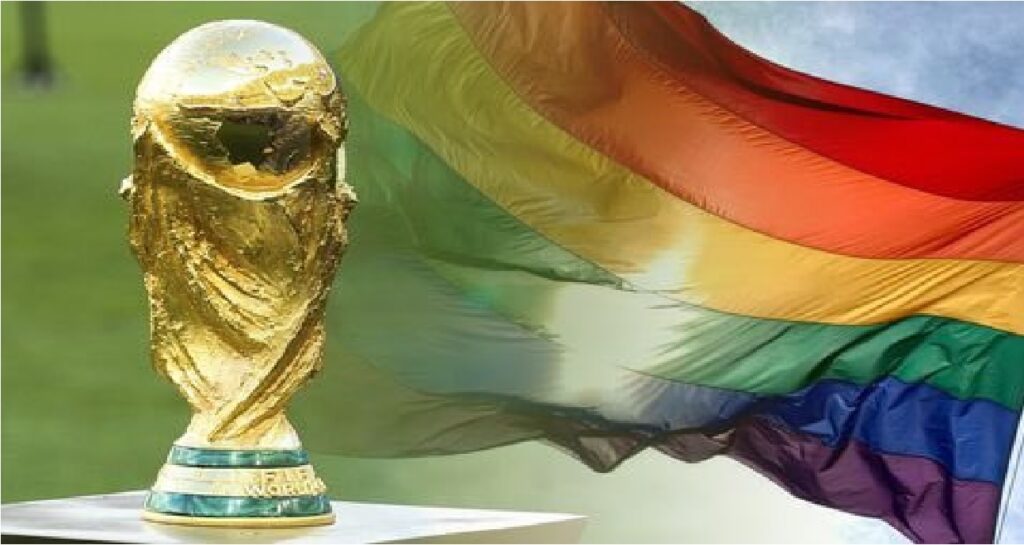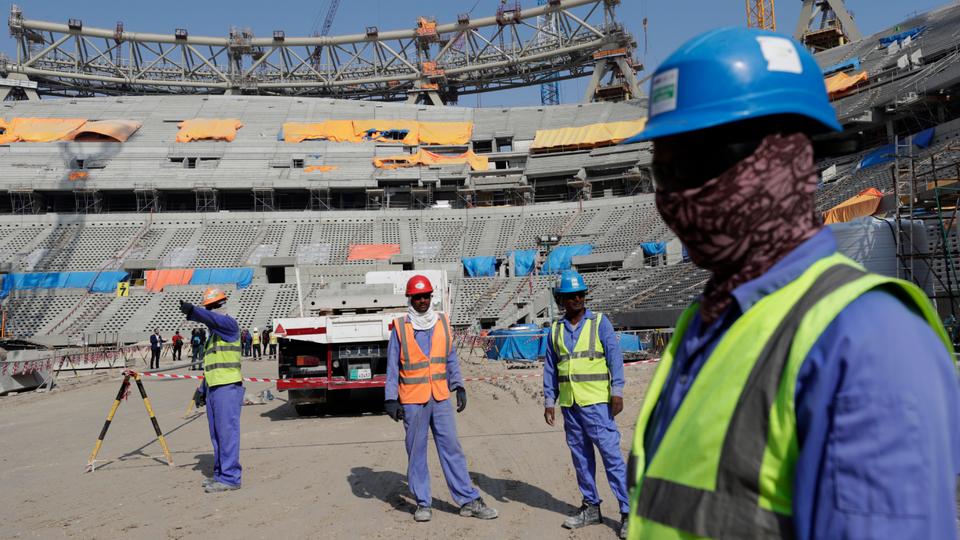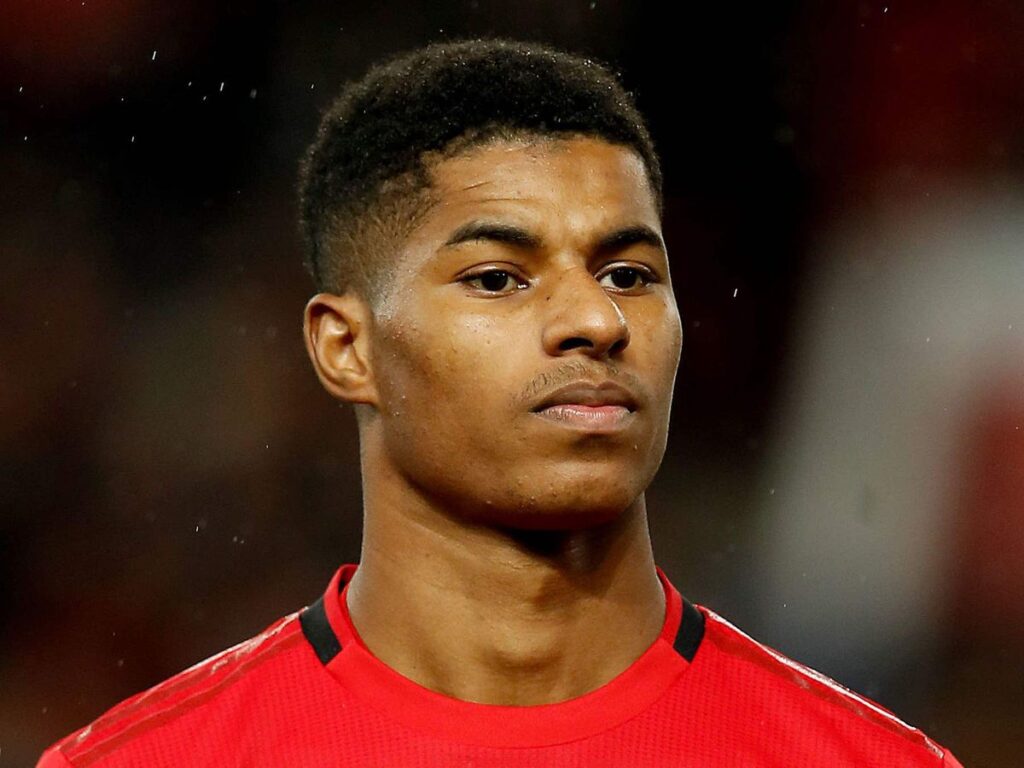Rhys Jameson gives his take on the Qatar 2022 Football World Cup
Capitalism is mired in a series of interlocking crises, everywhere you look there is crisis: the economy, politics and the environment just to name three, and there are many, many more. In fact, it is getting extremely difficult to find an aspect of modern life that isn’t plagued by uncertainty and chaos. In this sea of swirling uncertainty, sport, particularly football, seemed like a steady rock that could support a lighthouse of hope for the capitalists that they could see to steer their way out of their endless crises and what better beacon of hope for capitalism could there be than a memorable football World Cup.
While some people have urged boycotting this tournament from the understandable aim of opposing the reactionary Qatari regime, TV viewing figures for the games suggest that in fact more people are watching than ever before. Does this mean that most football fans have at best suspended their critical facilities or at worst simply don’t care about injustice or is it that, as most of the capitalist media maintain, that football itself is apolitical?
The capitalists and their media would obviously like that to be true but the staging of a World Cup in a country with a reactionary regime during a converging crisis of capitalism is already provoking more political protests than were previously staged in and around all the previous world cups taken together. This has little to do with attacking Islam or “Orientalism” on behalf of westerners. After all, remember that England itself has only ever won the world cup in a country where homosexuality was still illegal. It has more to do with the Qatar regime’s current appalling record of human rights offences.

The pitch was invaded at the Portugal-Uruguay match by Mario Ferri, who has staged such protests before at the Brazil World Cup to raise the issue of children living in poverty there. In Qatar he highlighted discriminatory laws for members of the LGBTQ+ community, the war in Ukraine and women’s rights protests in Iran. Speaking after the game Portugal’s Rúben Neves was supportive “We know what has happened around this World Cup. It’s a normal thing to happen. Of course, we are all with them as well – Iran as well, because I saw his shirt. I hope nothing happens to the boy because we understand his message and I think all the world understands it as well.”
Inspired by bravery
Before their match with England the Iranian team refused to sing the national anthem, an act of protest against the Iranian state. Images of two Iran fans in shirts carrying the name of Mahsa Amini, whose death triggered the massive protests across that country, have been transmitted across the world. Inspired by the bravery of Iranian women, many people are now also speaking out on the lack of basic freedoms for Qatari women to be themselves, love who they want and be free from violence.
Women in Qatar require a male guardian’s permission to marry, study abroad, drive (until 2020), travel and receive reproductive healthcare. Domestic violence and marital rape are not crimes in Qatar. Men can divorce at will and take four wives. Woman can only divorce if they have a “legitimate reason”, and even if they have custody of their children, are not allowed to be their legal guardians. Earlier this year a woman raped in Qatar was charged with engaging in “extra-marital sex”, when the man claimed she consented. She faced a sentence of seven years in prison and 100 lashes.

The Kafala system in Qatar means migrant workers are the ‘property’ of a ‘sponsor.’ Basic work regulations do not apply to them. Hence, the Kafala system is seen as a form of modern slavery. This has not passed unnoticed among football fans in Germany; the strongest demonstrations came from fans of Borussia Dortmund, Bayern Munich, and Hertha BSC. The latter held a banner with the message “15,000 dead for 5,760 minutes of soccer! Shame on you!”
Morocco, at their first World cup since 1986, celebrated their progress to the second round with a show of solidarity with their supporters by raising the Palestine flag in solidarity with the people who are suffering as a result of Israel’s occupation in a clear show of internationalism.
Different outlook
From an English point of view this World Cup is a welcome end of the line for Skinner and Baddiel and their dreadful mawkish dirge “Football’s coming home“. In that song, it was 30 years of hurt and that was 26 years ago! Wanting England to do well is one thing but encouraging those two and their reactionary sentimentality is quite another. Thanks to the players shunning them, we are now almost rid of them. Speaking personally, the only way I want to see three lions on their chests is if Longleat will loan them out for the day.
We have a completely different outlook from the England players too, gone are the precocious brats of the so-called “golden generation” to be replaced by the socially aware young men epitomised by Marcus Rashford, who is admired as much for his campaigning against child poverty as his vital England goals.
Those, like the Qatari regime and the capitalist media, who are astonished and outraged by these protests should really have taken heed of the words of Johan Cruyff – “If you have to run to the ball then you are standing in the wrong place”. Football is life, so don’t be too surprised when life inserts itself into football.
Sport-washing own goal
The attempt at “sport-washing” the Qatari regime is now beginning to look like a spectacular own goal. Far from washing away their sins and allowing them to bask in the kudos of being the perceived facilitator of moments of pure footballing joy, it has, instead, put them and their nasty deeds in the spotlight of a previously indifferent but nevertheless very shrewd audience. Football fans cannot generally be fooled about football as easily as they might sometimes be with other things in life. Of all the unimportant things in the world, football is the most important.

While of course we all want the team who we have the most emotional attachment with to do well, we shouldn’t lose sight of the main goal – that Marxists should champion the interests of the whole working class and at the same time bring to the fore the ultimate aim of our movement, to end capitalism and so put an end to exploitation once and for all.
This means taking steps to develop and encourage the game in all the centres of the proletariat, particularly in the poorer ex-colonial world and at the same time campaigning to eject the capitalist hijackers from our game and return it to the nurturing democratic control of the working-class communities that raised it.
Football, like all activities that have grown up in our current society, is riddled with contradictions and exploitation produced by the influence of capitalism. However, it is, in reality, another area of struggle between working class supporters and the oligarchies who currently control the modern game. At its best, football is a proletarian art form that bridges communities on the grandest stage to fly high the banner of sport and proletarian internationalism. This builds the capability (in the words of Kipling’s poem – If, to “meet with triumph or disaster” and the perspective to “treat those two imposters just the same”. It brings joy to the heart because even in the depths of defeat, hope remains.
This World Cup has been completely taken over at the top by capitalism: an exploitative, corrupt, degenerate system that is rotten from head to toe. But despite this, the voices of opposition are still breaking through. The only real solution to the problem of dirty money spoiling the ‘beautiful game’ is to place ownership and control of football in the hands of supporters, staff, and local communities. The World Cup and other major international events can lead workers around the world to draw conclusions about the global nature of their suffering, and the global system that causes it, capitalism.



